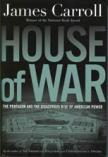Military Monolith
In October 1967 hundreds of thousands of college students and ordinary citizens gathered in Washington, D.C., to express their outrage about the Vietnam War. The pranksters of that time, including Abbie Hoffman and Jerry Rubin, told the newsmen covering the march that they also hoped to levitate the Pentagon.
James Carroll, then a young Catholic seminarian, joined the marchers that day. As the son of Air Force Lt. Gen. Joseph F. Carroll, the first director of the Defense Intelligence Agency, Carroll’s presence at this demonstration marked a demarcation line separating him from his father and the values symbolized by the Pentagon, the building his father worked in and in which he played as a child.
After my initial infatuation with the Pentagon, I had been conscripted into youthful criticism of America’s wars, and therefore of the building’s work, writes Carroll in House of War: The Pentagon and the Disastrous Rise of American Power.
In this brilliant work of history, journalism and biography, Carroll argues that the Pentagon and the nation’s military have controlled a disproportionate share of our nation’s civic and economic resources. So much money, so much power, so much cultural energy has been invested in the Pentagon, Carroll writes, that it was now taking on a life of its own. That life is my subject.
That life began with a groundbreaking ceremony on Sept. 11, 1941, just two years before Carroll’s own birth. The significance of this month and day 60 years later for the terrorist attacks that occurred in New York and Washington supplies the memories for the back-story of Carroll’s narrative.
When the building was hit by flight 77, I recognized for the first time in years how the Pentagon seared my soul when I was a boy. Soon that primal identification of man and building would form the unslippable knot of my young life, forever tying me to the mystical stake in the middle of the five-sided courtyard, if only I could find it.
Carroll, like his entire generation, can rightly claim, as he adds later, that the lifetime of the Pentagon is my lifetime. His principal concerns in this book, though, are the ways in which the accumulation of Pentagon power effected what amounted to a mutation in the meaning of American power, with cosmic consequences both at home and abroad.
In great detail, Carroll describes how presidents from Harry S. Truman through Ronald Reagan, Bill Clinton and George W. Bush, failed and succeeded in mustering the Pentagon bureaucracy to support their respective domestic and foreign policy goals.
The tragedy of Bill Clinton’s forfeiture of responsible command authority over the Pentagon on the radioactive question of America’s nuclear posture, Carroll writes, is that he showed every sign of having the temperament, intelligence, and experience to have been an excellent American respondent to Gorbachev and Yeltsin, building on the nuclear reductions Reagan and Bush had accomplished despite their limits of temperament, intelligence and experience.
Under George W. Bush, whom Carroll describes as a self-styled war president, the Pentagon budget continues to rise: Just as had happened with the Korean War in 1950, the missile gap in 1958, the Soviet invasion of Afghanistan in 1979 and the Iraqi invasion of Kuwait in 1990, President Bush’s open-ended war justified urgent and massive increases in military spending just when it seemed about to decline.
In assessing and scrutinizing the conduct and policies of the Pentagon’s leadership since World War II, Carroll provides strong documentary evidence to support his argument, including over 100 pages of footnotes.
As a first-rate researcher, he reports on previously little-known facts like Eisenhower’s disappointment regarding the Soviet capture of U-2 spy pilot Francis Gary Powers on May 1, 1960: Later I would learn that the president was angry that Powers hadn’t committed suicide, as captured CIA agents were supposed to do.
The story includes the voices of many of Carroll’s heroes: Dorothy Day, Martin Luther King, Gandhi and Daniel Berrigan, of whom the author writes: I think of Daniel Berrigan, the dignified Jesuit priest whose presence at the Pentagon demonstration sanctioned mine. Berrigan was a role model to me.
While expressing his affection for these religious figures, Carroll can still acknowledge his admiration for Colin Powell, the Jamaican immigrant’s son who became a four-star army general.
Even to opponents of the war, his standing as the single most powerful African American in the nation’s history has appeal. The army, against all odds, had become the most integrated institution in the nation, and the top soldier’s obvious competence was a source of universal pride.
House of War is much more than a military history. It takes the reader into the background and lives of the individuals who battled for and against what the Pentagon stood for. It succeeds as a work of journalism, biography and history because, like Anthony Lukas’s Common Ground and Robert Caro’s The Power Broker, it weaves together the personal and public to create a compelling narrative.
Mostly, though, the Pentagon is a story of ordinary people who acted with good intentions, faced tragic dilemmas and resisted what they saw happening right in front of them. One of them was my father, which makes me the chastened storyteller.
This article also appeared in print, under the headline “Military Monolith,” in the November 27, 2006, issue.








